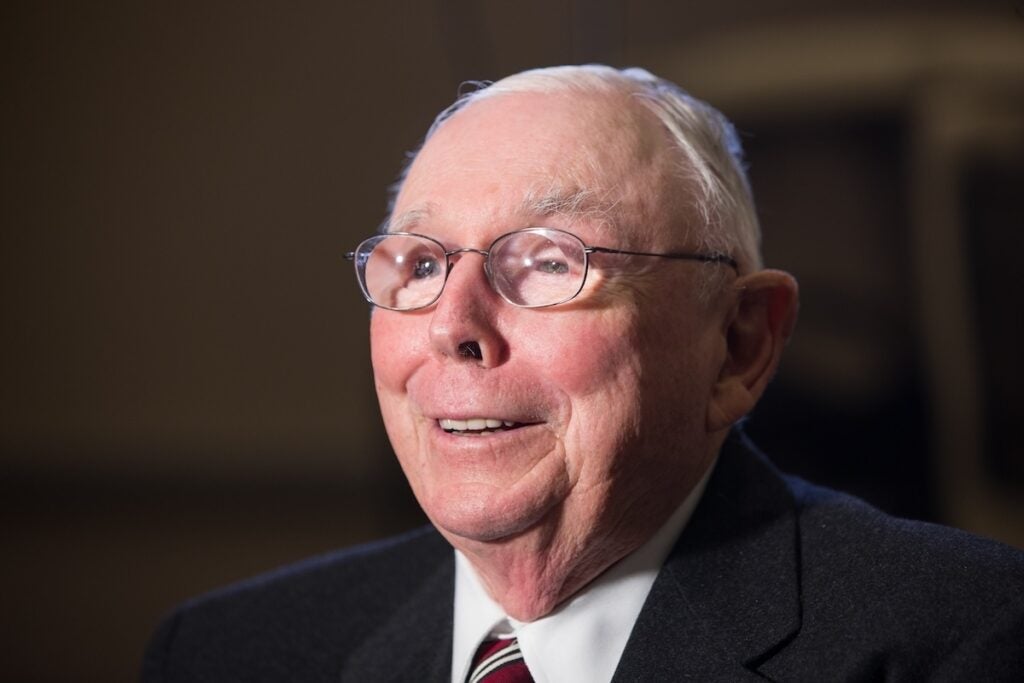Charlie Munger looked at the American healthcare system and gave the kind of diagnosis that does not come with a gentle bedside manner.
The longtime Berkshire Hathaway vice chairman, Republican and Warren Buffett‘s closest business partner thought the cure was simple, politically explosive, and inevitable.
In Munger’s view, the U.S. needed single-payer healthcare, and younger generations would live long enough to see it.
Don’t Miss:
He laid out his case in a 2017 interview with Yahoo Finance’s Andy Serwer, six years before he died. In the chat just after Berkshire’s annual meeting, Munger made it clear he did not fit neatly into his party’s talking points.
“I’m not a normal Republican,” he said, adding that there was “a lot wrong” with the way Americans pay for care.
Munger didn’t dispute that his country delivered world-class treatment at the top. If someone had a rare cancer or landed in an intensive care unit, he believed the U.S. could be the best place to be.
What bothered him was everything wrapped around that care. He described the structure as a Rube Goldberg creation that “arose by accident” and complained about “massive amounts of excess cost” baked into the system.
When Serwer pressed him on what would actually fix the U.S. system, Munger didn’t drift into vague reform talk. “Having a basic level of care for everybody with no insurance aspect as a right I think is a good idea,” he said.
That’s the core of what single-payer healthcare means in practice. Instead of a patchwork of private insurers, employer plans, and government programs, one central payer, usually the federal government, picks up the tab for covered medical care.
Trending: From Moxy Hotels to $12B in Real Estate — The Firm Behind NYC’s Trendiest Properties Is Letting Individual Investors In.
Everyone is in the same core system from the start. Doctors and hospitals can still be public or private, and wealthier patients can still pay for faster or more luxurious options. The model looks a lot like Canada’s structure, or like Medicare expanded across the entire population instead of just older adults.
Munger thought that mix struck the right balance. He said a “benign despot” would design a single-payer system with the option to opt out into private care that is “a little faster or a little fancier,” similar to Europe and Canada.
When Serwer asked directly whether single-payer really was the answer, Munger did not hedge. “Yes,” he said. On the follow-up about a high-end opt-out, he answered the same way. Then he made a prediction: “I think you young people will live to see a healthcare system that looks a lot like Canada’s with a better private opt out system. I won’t.”
Munger did not soften his stance a year later. In a 2018 interview with CNBC, he called the U.S. system “shot through with rampant waste” and that some of what he saw as a hospital trustee was “deeply immoral.”
“A lot of the medical care we do deliver is wrong” and “so expensive and wrong,” he argued, and he accused parts of the industry of artificially prolonging death to make more money. This was not just a budgeting issue for him. It had crossed into an ethical one.
Munger also tied healthcare costs directly to the broader economy. Buffett had famously warned that rising medical expenses were a “tapeworm” on American business. He agreed and pushed the point further, arguing that U.S. manufacturers carry a “huge competitive disadvantage” compared with companies in Europe, where governments shoulder far more of the health tab.
See Also: An EA Co-Founder Shapes This VC Backed Marketplace—Now You Can Invest in Gaming’s Next Big Platform
In Munger’s view, the U.S. system was punishing employers, distorting competition, and still failing patients.That is why he believed politics would eventually catch up to the math. He predicted the next time Democrats controlled the White House, the House, and the Senate, the country would “get single payer medicine.”
That moment arrived in early 2021, when Joe Biden took office and Democrats held narrow majorities in both chambers. But the forecast never materialized.
The U.S. still relies on a mix of private insurance, employer coverage, Medicare, Medicaid, and Affordable Care Act plans. A national single-payer system remains a debated idea, not law.
That gap between Munger’s prediction and reality is what makes his comments stand out today. A lifelong Republican and one of the most respected investors of his generation publicly argued that healthcare should be a universal right with a simple, centralized way to pay for it. He thought the existing setup was too costly, too complicated, and too tilted toward middlemen.
Whether lawmakers ever move toward the Canada-style structure he described is still an open question. What is clear is that Munger did not see single-payer as a radical experiment. He saw it as a cleaner line on the balance sheet and a more honest way to provide that “basic level of care for everybody” he believed the country owed its citizens.
Read Next: Bill Gates Says Climate Change ‘Needs to Be Solved’ — This Award-Winning Building Material Is Tackling It Head-On
Image: Shutterstock
UNLOCKED: 5 NEW TRADES EVERY WEEK. Click now to get top trade ideas daily, plus unlimited access to cutting-edge tools and strategies to gain an edge in the markets.
Get the latest stock analysis from Benzinga:
This article Charlie Munger Said Single-Payer Is the Fix America Needs. ‘Having a Basic Level of Care for Everybody’ Should Be a Right, Even With No Insurance originally appeared on Benzinga.com
© 2025 Benzinga.com. Benzinga does not provide investment advice. All rights reserved.
